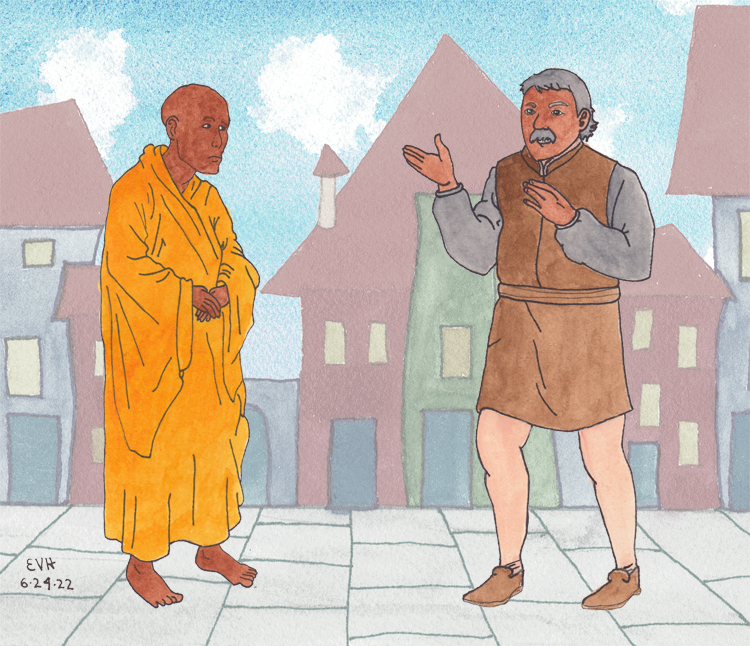
Jataka 337
Pīṭha Jātaka
The Seat
as told by Eric Van Horn
originally translated by H.T. Francis and R.A. Neil, Cambridge University
originally edited by Professor Edward Byles Cowell, Cambridge University
Anāthapiṇḍika and Visākhā are two of the legendary figures in Buddhist history. They are the archetypes for generosity, although they had quite different temperaments. Anāthapiṇḍika was quiet and respectful, while Visākhā was quite feisty. But both represent the very best of Buddhist lay devotion.
“Alas! We offered you.” The Master told this story while living at Jetavana. It is about a certain monk. He came, it was said, from the country to Jetavana, and, after putting away his bowl and robe, he saluted the Master Then he asked the young novices, “Sirs, who looks after the newcomers who come to Sāvatthi?”
“The Treasurer Anāthapiṇḍika,” they said, “and the great and holy lay sister Visākhā look after the Saṇgha. They stand in the place of father and mother to them.”
“Very good,” he said.
On the next day—quite early, before a single monk had entered the house—he went to Anāthapiṇḍika’s door. Because he arrived at such an early time, there was no one to attend to him. So without getting anything there, he went to the door of Visākhā’s house. There he also got nothing because it was such an early hour. After wandering about, he went back. But the rice had all been given out, so he went off. Again he wandered about, and on his return, once again found the rice had all been given out. So he went back to the monastery, and he said, “The monks here speak of these two families as faithful believers, but both of them really are without faith, and they are non-believers.” In this way he went about abusing these families.
So one day they started a discussion in the Dharma Hall, about how that monk from the country went to the door of certain households too early. And failing to obtain alms, he went about reviling those families. When the Master came, he asked what the topic of their conversation was. On hearing what it was, he called the monk and asked him if it were true. When the monk said, “Yes, your reverence, it is true,” the Master asked, “Why are you angry, brother? In times past, before a Buddha arose in the world, even recluses, when they visited a household and received no alms, showed no anger.” And with this he told them this story from the past.
Once upon a time when Brahmadatta was reigning in Benares, the Bodhisatta was born into a brahmin family. When he was of age, he studied all the arts at Takkasilā University. Subsequently he adopted the religious life of a recluse. After traveling for a long time in the Himālayas, he went to Benares to obtain salt and vinegar. He took up his residence in a garden, and on the next day he entered the city for alms.
There was at this time a merchant at Benares who was a faithful believer. The Bodhisatta asked where there was a believing household. When he heard of the merchant’s family, he went to the door of his house. At that moment the merchant was away paying his respects to the King, and none of his people happened to see him. So he turned back and went away.
When the merchant was returning from the palace, he saw him. After saluting him, he took his alms bowl and led him to his house. There he offered him a seat and comforted him by washing his feet. He gave him rice, cakes, and other food, and in the course of his meal he asked him one thing and another. After he had finished eating, he saluted him and sat respectfully on one side. Then he said, “Reverend sir, strangers who have come to our doors, whether beggars or holy priests or brahmins, have never gone away without receiving marks of honor and respect. But today, because you were not seen by our retainers, you went away without being offered a seat, or water to drink, and without having your feet washed, or rice and gruel given you to eat. This is our fault. You must forgive us for this.” And with these words he uttered the first stanza:
Alas! we offered you no seat,
No water brought, or something to eat,
We here confess our sinfulness,
And pardon humbly, holy sir, entreat.
The Bodhisatta—on hearing this—repeated the second stanza:
Nought have I to condone,
No anger do I feel,
The thought just once I own
Across my mind did steal,
“Habits of people here
Are just a trifle queer.”
The merchant hearing this responded in two more stanzas:
The custom of our family—’twas so
Received by us from ages long ago—
Is to provide the stranger with a seat,
Supply his needs, bring water for his feet
And every guest as family dear to treat.

Figure: “The custom of our family…”
And the Bodhisatta, after staying there for a few days and teaching the merchant of Benares his duty, went back to the Himālayas. There he developed all the Faculties (1) faith/confidence, 2) energy, 3) mindfulness, 4) concentration/samadhi and 5) wisdom/insight) and the Attainments (jhānas).
The Master, having ended his lesson, taught the Four Noble Truths. At the conclusion of this teaching the monk attained fruition of the First Path (stream-entry). Then he identified the birth: “At that time Ānanda was the merchant of Benares, and I was the recluse.”
